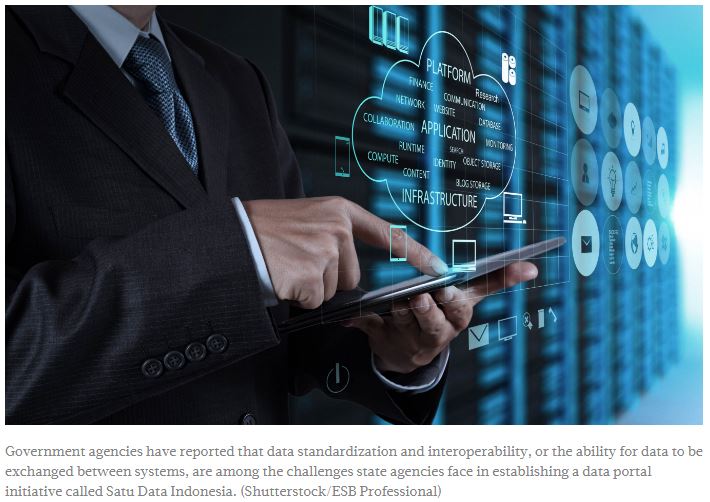Data standardization poses challenge for Satu Data Indonesia plan
Government agencies have reported that data standardization and interoperability, or the ability for data to be exchanged between systems, are among the challenges authorities face in establishing a data portal initiative referred to as Satu Data Indonesia (One Data Indonesia).
The National Development Planning Agency (Bappenas), which acts as the program’s director, explained that the agency was instituting a standard on data collection and data filing between state agencies in order to increase efficiency within the system.
“So far, we know that there is no standard in [our] data, whereas we hope that data can support the planning, execution, evaluation and control of [the country’s] development,” Bappenas expert staff member and secretariat coordinator of Satu Data Indonesia Oktorialdi said during a webinar on Tuesday.
Indonesia has been struggling with data scattered around different government ministries and institutions, hindering the authorities in devising data-based policies and the public in obtaining accurate data, as institutions publish different figures on the same object.
The Satu Data Indonesia portal, accessible via data.go.id, aims to increase the government’s transparency and accountability by providing public access to data from various state agencies, as well as to support data-driven policy-making.
The initiative was officiated in June last year when President Joko “Jokowi” Widodo signed Presidential Regulation (Perpres) No. 39/2019 on Satu Data Indonesia, ordering state agencies to reinforce the program with data trustees and data producers.
Oktorialdi reported that only 47 of 85 state agencies had named their data trustees for the initiative, calling on the rest of the state institutions to submit the names to Bappenas.
Under Satu Data Indonesia’s action plan, the agency planned to develop a data center as well as big data in 2021 after strengthening procedures for data collection this year.
However, digital data governance has yet to be adopted equally between different state institutions, further hampering the process.
“The implementation of an electronic government system (SPBE) is still being done separately or still shallow and has yet to build collaboration and integration within state agencies,” the Administrative and Bureaucratic Reform Ministry’s undersecretary for institutions and governance, Rini Widyantini, said during the webinar.
According to the ministry’s data, the national SPBE index stood at 2.18 in 2019, a 20 basis point increase from last year. Most ministry offices scored well on the index, with 82 percent of 34 ministries achieving the target score of above 2.6.
Meanwhile, digital transformation lags in regional offices, the data show. Of the 384 regional agencies the ministry surveyed, 80 percent scored below target.
To assist with the digital transformation, Rini recommended developing an integrated information technology infrastructure and increasing the human resource capacity, among other things.
Indonesia’s data governance has seen improvements over the years. Indonesia ranked 88th on the United Nations’ (UN) e-government index 2020, up 19 places from 2018. The index is published by the UN Department of Economic and Social Affairs over a two-year period.
The UN’s e-government survey states that countries in the Asian region are making progress toward digital transformation, with Indonesia and the Philippines having used digital social registry systems as gateways for social protection programs.
“Digital registry systems such as these allow more transparency and credibility in the design and delivery of social protection programs,” the report says.
On that note, Sudarto, the Finance Ministry’s expert staff member on organization, bureaucracy and information technology, said the ministry was in partnership with the Social Affairs Ministry to deliver social aid to almost 30 million beneficiary families.
He explained during the webinar that the ministry had used existing data infrastructure, in this case, the citizenship identification number (NIK), as data reference, while striving for good data interoperability in the process.
“The data must be well-organized, and there must be interoperability with the entirety of financial data,” Sudarto said.
Source: https://www.thejakartapost.com/news/2020/08/06/data-standardization-poses-challenge-for-satu-data-indonesia-plan.html


 Thailand
Thailand




